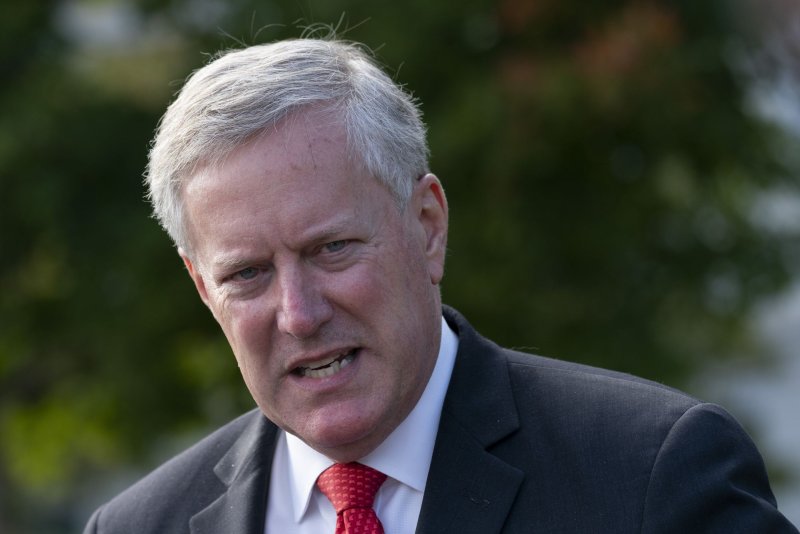1 of 4 | A federal judge in Washington has dismissed a lawsuit filed by former White House chief of staff Mark Meadows that sought to block the Jan. 6 House investigative committee from obtaining phone and text data he initially withheld. File photo by Chris Kleponis/UPI |
License Photo
Nov. 1 (UPI) -- A federal judge in Washington has dismissed a lawsuit filed by former White House Chief of Staff Mark Meadows that sought to block the Jan. 6 investigative committee from obtaining phone and text data that could potentially link him and former President Donald Trump to the 2021 riot at the U.S. Capitol.
Two subpoenas that were issued by the House select committee were targeted in Meadows' legal action, but in a 27-page ruling, U.S. District Judge Carl J. Nichols said lawmakers and legislative actions were protected from civil suits under the "speech or debate" clause of the Constitution.
Meadows has been in a nearly yearlong legal battle with the committee over his refusal to testify as the investigation hones in on Trump's inner circle and an alleged nationwide conspiracy to overturn the results of the 2020 election.
He was first subpoenaed in September 2021 after the committee said evidence showed Meadows was central to Trump's aims to sow doubt in the election results with claims of widespread vote rigging. Meadows was also on the infamous phone call in which Trump urged Georgia Secretary of State Bob Raffensperger to "find" enough votes to throw the state in his favor.
Meadows has the option to appeal Monday's ruling while the clock is ticking down to a week before Election Day when Republicans expect to retake control of the House and would almost certainly put the brakes on the investigation.
Notably, several other exhibits that Meadows raised in the lawsuit remain on the table, including the question of whether a senior White House aide can be forced to testify against a former president, and whether Trump can still claim executive privilege after leaving office. The suit also raised the issue of whether a sitting president could blackball a former president's assertion of the privilege.
Under Trump, Meadows repeatedly urged the Justice Department to investigate election conspiracy theories, and on the day of the riot, he was in close communication with Congress members, rally organizers and the former president before the mob stormed the Capitol to disrupt the certification of Joe Biden's election win.
In December, Meadows sued the committee and House Speaker Nancy Pelosi, alleging that the panel, in seeking his records, had issued "two overly broad and unduly burdensome subpoenas."
Previously, Meadows surrendered thousands of documents to the committee, including more than 2,300 text messages that raised suspicions and led the committee to subpeona Meadow's carrier Verizon for the metadata on his mobile device. Meadow's also withheld more than 1,000 separate documents and claimed they were protected by executive privilege.
The committee turned to the Justice Department in an attempt to get Meadows charged with contempt of Congress, but the agency never moved on the case, and Meadows has not been compelled to appear and testify before Congress.















